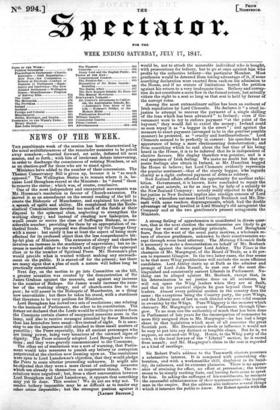A strong feeling of apprehension is manifested in divers quar-
ters, that at the next election the constituencies are likely to go wrong for want of some guiding principle. Lord Brougham' fears, from the want of the usual party motives, a wholesale re- turn of obscure gentlemen, unknown to their constituencies ex- cept through some local attorney. The Morning Chronicle finds it necessary to make a demonstration on behalf of Mr. Roebuck at Bath, against the interloper Lord Ashley. The Times is the champion of Mr. Macgregor, of the Board of Trade, as a fit per- son to represent Glasgow. In the two latter cases, the fear seems to be that mere Whig predilections will exclude the more efficient candidates. Lord Ashley starts up at Bath as the admirer and protege of Lord John Russell, to oust one of the most dis- tinguished and consistently earnest Liberals in Parliament. No- thing can be alleged against Mr. Roebuck, except that, in his determination to see justice done on all occasions, he will no spare the Whig leaders when they are at fault, and that in his practical objects he goes beyond those Whig leaders. Almost every political section in the country does the same : the exceptions being the Country party, the pure Whigs, and the Liberal man of law in each district who sees solid reasons in swearing by the Whigs. Pure Whiggery is the monster which obstructs Mr. Macgregor's access to Parliament through Glas- gow. To no man can the authorship of much that has been done in Parliament of late years for the emancipation of commerce be more fitly assigned than to Mr. Macgregor—he has had a large share in that legislation which most of all concerns the great Scottish port. Mr. Dennistoun's deeds or influence it would not be easy to put into any distinct or tangible shape. But he is, we suppose, an out-and-out Whig. Hence, to the Whig party of the town, to the local lawyer of the "Liberal" section, he is sacred from assault; and Mr. Macgregor's claim to the seat is regarded as a kind of sacrilege.


























